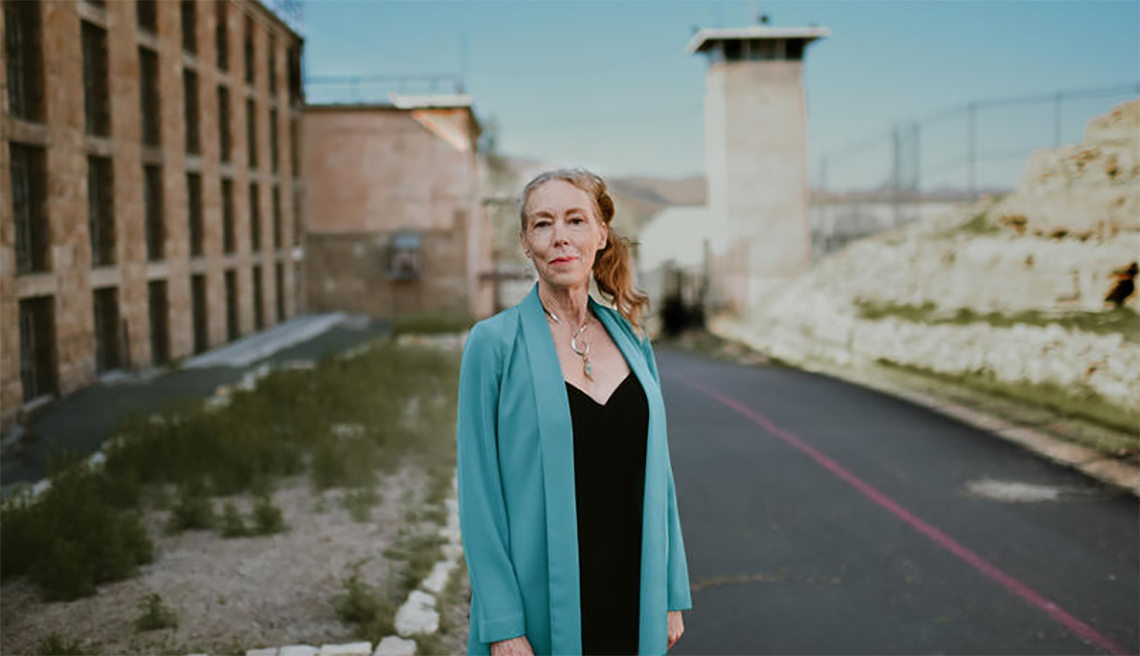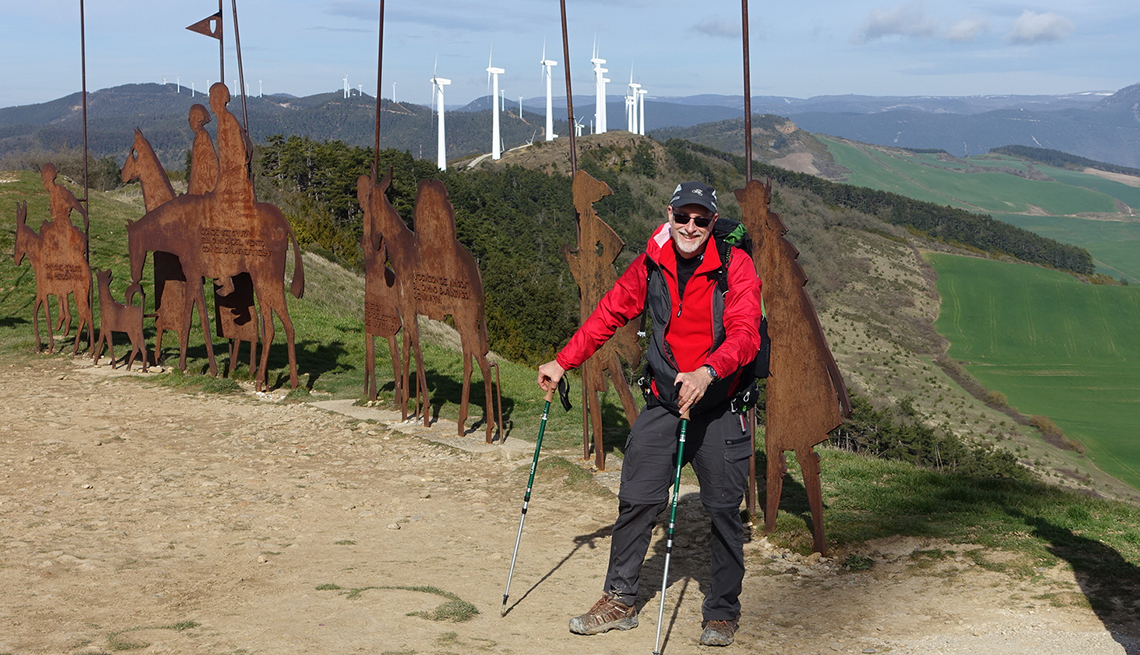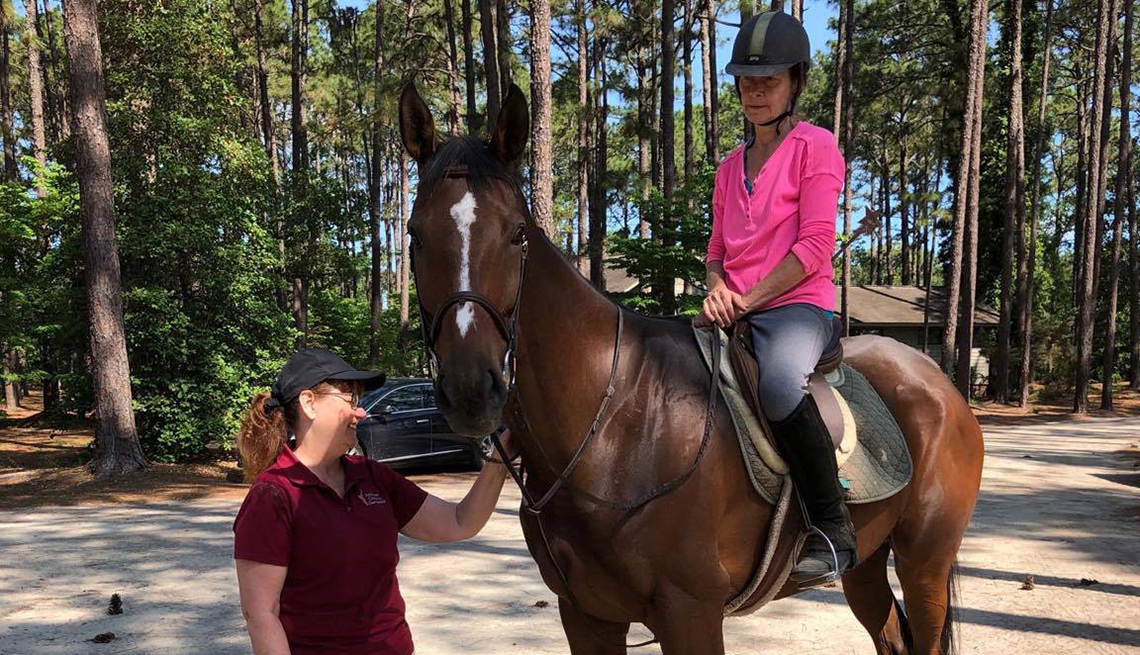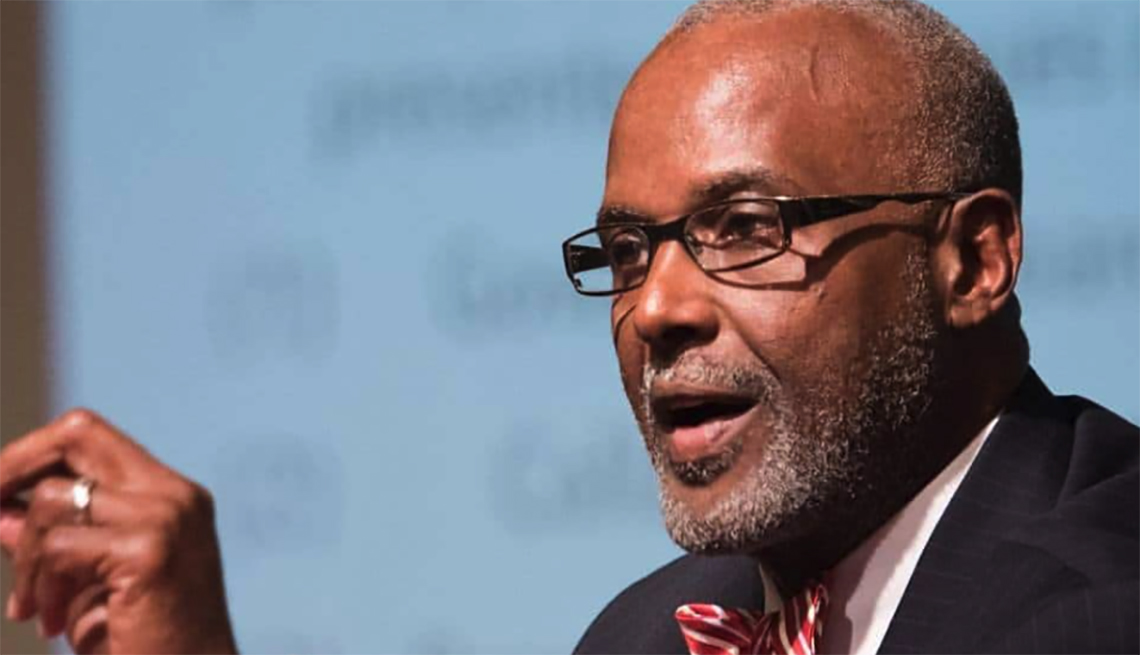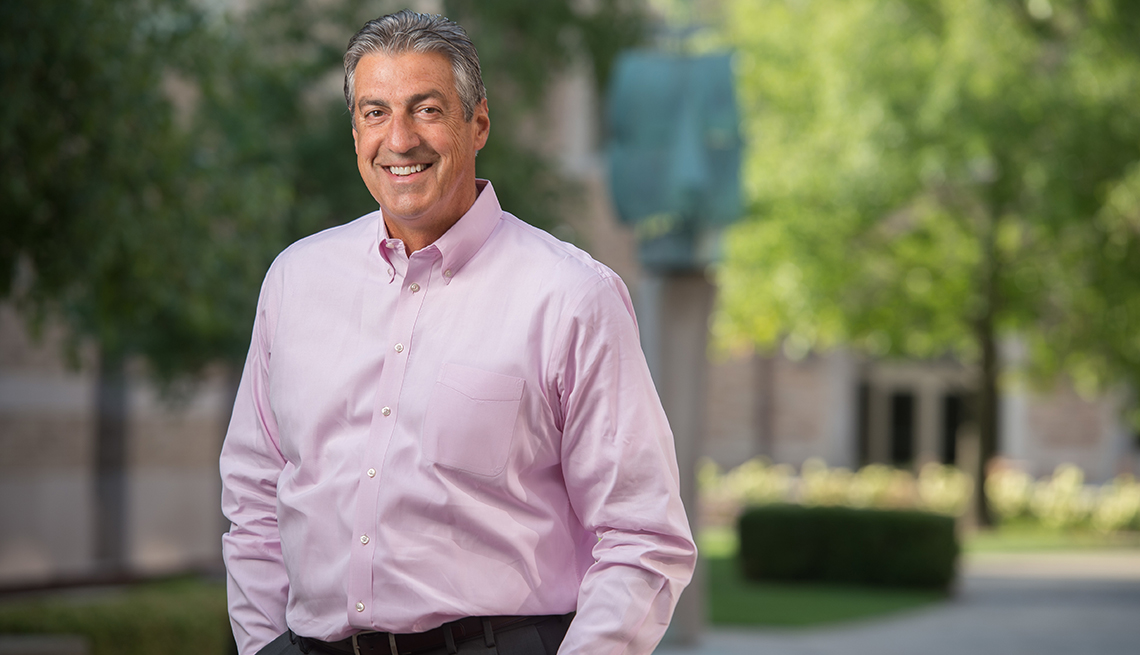5 Retirees Find Purpose in Their Second Act Careers
Coronavirus hinders, but doesn't halt, pursuing new ventures
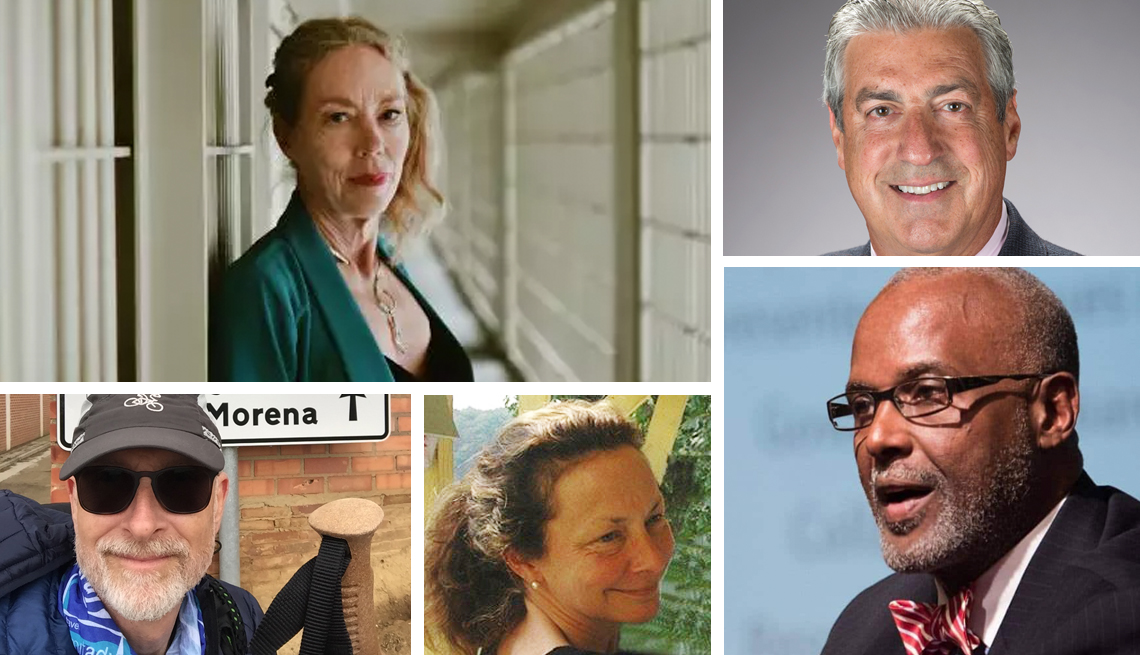
Photos by Lauren Casto, University of Notre Dame, Courtesy Raymond Jetson, Holly Carter, and Russ Eanes
AARP recently spent time with five retirees to learn how their post-retirement work is bringing meaning to their lives and making a difference in the world, even as the coronavirus pandemic rages. Here are their stories.
Dr. Karen Gedney
From medical doctor to mentor
"Retirement is about ikigai,” said Karen Gedney, 63, who retired four years ago from her job as a senior physician at the Nevada Department of Corrections medical center in Carson City. The Japanese word translates as a sense of purpose and meaning and a feeling of well-being.
“For me, it's putting a foot forward and trying new things,” Gedney said. “It's not about retreating and withdrawing. I decided that I wanted to be in the mix, and not be a spectator, so I wake up with a purpose every day, a reason to get out of bed."
She's on to something. The vision of spending retirement years gardening, golfing and traveling is passé. Meaningful work — whether for pay or not — is in. Gedney has created a patchwork quilt of activities since she stepped away from her three-decade career. “The biggest challenge when I stopped [working] was, ‘Where do I want to put my energy?'” she said.
But she gradually pieced it together. She wrote a memoir, 30 Years Behind Bars: Trials of a Prison Doctor, and spends time speaking and lecturing on prison reform. “I wanted the outside world to see it from a different perspective— one of someone who wanted to heal,” she said.
She went back to school and became board certified in anti-aging and regenerative medicine. “I love to teach, but I didn't want to do it as a business because it is very much playing to people's insecurities, so I give free talks on healthy aging and nutrition,” she said.
She volunteers as a board member at the Ridge House, an organization that provides residential and out-patient assistance for individuals struggling with addiction.
And, importantly, she's a mentor to at-risk children who have a parent in prison — currently a 12-year-old boy and a 16-year-old girl. “They've become more like my godchildren,” Gedney said. “We work out together, play basketball and take hikes.” Recently, she's tapped her medical background to teach the kids about the coronavirus.
"Having the time to make an impact on the kids is key to finding meaning in my life at this stage,”
Not surprisingly, for Gedney the coronavirus has stopped some of those activities. “I wasn't able to take them to the gym, the mall, movies, teach and feed them at my house,” she says. “I interacted with them on the phone and dropped off needed supplies or presents for them, like ice cream, and sent them messages to know that I care about them and that this quarantine will end."
But now she can interact with the kids again. “Last weekend, I took Dante, the 12-year-old, golfing,” she said. “We had some interesting discussions about Black Lives Matter and George Floyd's tragic death.”
"Having the time to make an impact on the kids is key to finding meaning in my life at this stage,” Gedney said. But it's also the reward of exploring an inner path that had eluded her. “Now I have a daily ritual where I meditate, exercise, and I'm learning Spanish from my neighbor, who is an international translator. I write these things down in my little book and as I go, I check them off. It makes me feel good to keep track of things I've accomplished."
Russ Eanes
500 miles to a new career
Sometimes finding one's retirement way is a solitary journey. Three years ago, Russ Eanes, then 60, left his job as a book publisher. “I was too young to really retire, but old enough to know that I needed to change the pace of my life,” said Eanes, who lives in Harrisonburg, Virginia. “I had decided that I never intended to formally retire, just work at a slower pace at work that I loved and found meaningful."
So Eanes spent five weeks walking 500 miles along the Camino de Santiago in Spain, an ancient pilgrimage path. “I had been dreaming of doing this for two decades and didn't want to put it off any longer,” he said. “It was deeply transformative."
“The next thing I will do in retirement is to help people tell their own stories and self-publish books."
For the first time, he had no particular agenda other than get up, pack his things into his backpack and walk to the next town. “It was an unscheduled, unhurried, unplanned life,” Eanes said. “It was a gradual slowing down of life and taking the time to notice things.”
That's when the idea came to him: “I had met so many people in my publishing career who had stories to share,” he said. “The next thing I will do in retirement is to help people tell their own stories and self-publish books."
To get it launched, Eanes wrote his own book. It took a year, but in 2019 he published The Walk of a Lifetime: 500 Miles on the Camino de Santiago. Writing the book was nearly as rich as the pilgrimage itself, Eanes said.
"I've loved to write all my life but never had the time between work and family,” he said.
Eanes had been at the bedside of his brother-in-law when he died at age 56 — 30 days after his cancer diagnosis. “He left undone a lot of things, which he was going to put off until retirement,” Eanes said. “He never got there. I decided I wasn't going to put things off. I want to live for some things I want to do now and not wait for some magical retirement age, and maybe never realize it."
"I have nothing to prove to anybody,” he said. “I have time now that if my son asks me to lend a hand to fix the roof on a shed, I can say, ‘Sure,’ and drop things to help."
The coronavirus has put a temporary halt to his hikes. “My next writing project, about walking in Italy, in Umbria, in the region that St. Francis inhabited, is now on a long-term hold, since it will likely be a year before I can return to Italy to walk for three weeks,” Eanes said.
But he's in a good place. Another book idea, about a weeklong bike ride from Pittsburgh to Washington, D.C., along the Great Allegheny Passage to the C&O towpath, has moved front and center. “I figure that a long ride like that [330 miles] will be possible by summer and will be fun to write. So, while I'd rather travel to Italy, I'm quite happy to stay nearer to home."
Eanes’ editing and self-publishing business, the Walker Press, is thriving. “Since all of my clients are over 60, perhaps the current crisis has spurred them all the more to finally undertake the books and memoirs that they are wanting to do,” he said. And he's offering his time to help a local farmer who needs someone to make free deliveries of food, since the local farmers market is closed.
Meantime, he's is relieved he retired when he did. “I'm glad I decided to do what I did two years ago,” he said. “I would never want to be in my old position again, worrying about employees and how I will pay them."
Save 25% when you join AARP and enroll in Automatic Renewal for first year. Get instant access to discounts, programs, services, and the information you need to benefit every area of your life.
Holly Carter
Back in the saddle again
Holly Carter, 68, loved redoing and reimagining residential and commercial properties for her interior design clients, but when she closed her business and retired in 2013, she returned to her childhood passion — horses. “I came from a family of artists and musicians,” Carter said. “When I was 4-years-old, I was given a cello, but it was a pony I wanted, and I was persistent.”
When she was 8, her parents caved. Her father had heard through one of his work colleagues of a malnourished and neglected pony at a nearby farm that could use some love and proper feeding. He rescued it for her, bringing it home in the back of his pickup truck.
The family was living in a rented home on a 500-acre dairy farm at the time, and he arranged for the new family member to have a place to live there. “You must take care of the pony before and after school, and you must practice your cello, or the pony goes,” Carter recalled that her parents told her. “I learned to get up early every morning. I wanted it so badly that it instilled a work ethic."
As an adult, her passion for horses never faded. Carter galloped on racehorses and eventually owned and competed her horses over jumps. For 15 years, though, she had to hang up her boots entirely as she navigated a difficult divorce and built her design business.
In time, she realized that the one way she could afford to get back to her love for horses was to adopt a thoroughbred ex-racehorse that had been cast aside by the racing world due to injury, lack of speed or an owner unable to pay for its care anymore. “My first rescue I found through Canter USA, an organization that rehomes ex-racehorses,” Carter said. “I paid $800 for Winter Escape. He had raced 105 times in five years. It took its toll. He had arthritis, but a heart of gold. And then I acquired two more for $750 each. I was paying for it all out of my design account."
Carter would use her gentle horsemanship talent to give the horses a second act. Before she realized it, she had found her new vocation: the Winter Farm, OTTB Rescue & Retirement, a nonprofit thoroughbred adoption program in Southern Pines, North Carolina, named after her first rescue, who is now 23 and still gets his morning hug and carrots from Carter. OTTB is short for “off-the-track thoroughbred” and the organization is dedicated to providing retired racehorses a second career and a safe, healthy life.
"It was just a passion in my gut to give back to the animals that blessed me so."
Carter lives in an apartment above the eight-stall barn on 20 acres that she rents. She's up by 5 a.m., feeds the horses and then mucks out the stalls. “I do most of the work myself, although we do have some wonderful volunteers who lend a hand when they can,” Carter said.
The organization's annual budget: $175,000. So far, Carter has rescued nearly 200 horses from a variety of sources, including kill pens where broken down and rejected racehorses wait to be sold for slaughter.
"It's a spiritual thing,” Carter said. “I felt that I had to pay back. Life had blessed me, even though I made mistakes in life. The blessings always came through the contacts I made with horses, and the mentors in my life were all the most wonderful horse people. I love horses going all the way back to the first pony that my dad rescued for me. It was just a passion in my gut to give back to the animals that blessed me so."
The coronavirus has taken its toll on her business. “I am maintaining,” Carter said. “Our biggest issue is with donations and monthly sponsors. They have decreased, and this is a huge hit to our monthly income. And I have no volunteers to help with the horse care as a result of social distancing. So I am doing all this by myself which is hard. Long days, short nights."
Raymond A. Jetson
MetroMorphosis
Raymond Jetson, 64, spends a great deal of time working to revamp the concept of what it means to be retired. He has retired twice and now is at the helm of the social enterprise MetroMorphosis, based in Baton Rouge, Louisiana. The nonprofit focuses on creating a different approach to community change and, in particular, issues affecting boys and men of color.
His interest began when more than a dozen African American teenage boys from a local high school in his community were facing suspension for participating in a “fight club.” “They were not involved in street fights, nor was there any intent to harm anyone,” Jetson said. “They were simply donning boxing gloves and boxing in locker rooms and restrooms after school."
Their plight touched him. “Where were the African American men who could have served as role models, mentors and friends? Where were the caring adults who could have prevented this? Where was I?” Jetson asked.
“That is why I wake up every day and ask myself, What will you do today that will matter 20 years from now?"
The heart of that work for Jetson is MetroMorphosis, which focuses on supporting change in inner-city neighborhoods. “We engage mentoring organizations and train the mentors as a part of our overall work,” he said. That effort brings together nearly two dozen organizations to form a network to recruit and train young people and connect them with mentors. So far, the group has 1,000 mentors in training.
"I want to see real change in the lives of boys of color in inner-city neighborhoods, where these African American boys are not graduating from high school,” Jetson said. “That is why I wake up every day and ask myself, What will you do today that will matter 20 years from now?"
It should be no surprise that Jetson became involved. His nearly 25-year career was defined by public service. He served as CEO for the Louisiana Family Recovery Corps, a nonprofit focused on supporting the recovery of families impacted by disasters. Before joining the Recovery Corps, Jetson was the deputy secretary of the Louisiana Department of Health and Hospitals. And he served District 61 in the Louisiana House of Representatives for more than 15 years.
"There is a fine line between being around long enough to really be of impact and being around too long, to become a part of the status quo,” Jetson said. “I realized I was at a hard transition point. I had been in state service for almost 25 years, so I decided to retire when I was in my mid-50s."
During his time in public service, he had also pursued a call to ministry. “My intentions were to leave state government and focus in on ministry for a time,” he said. And he served as the pastor of the Star Hill Baptist Church, the church he had attended as a child, for 23 years before retiring in December 2017.
But, in fact, he didn't really retire. “I took a weeklong golf vacation to Florida, played golf all day, ate well and came back and dived into my work at MetroMorphosis, which I had founded and then incorporated in 2012,” he said. “I wanted to become more focused on restoration of my neighborhood and inner-city neighborhoods like that. My passion was deeply rooted in this angst at what I was seeing."
“I'm an African American, college-educated man, who grew up in the kind of neighborhoods these teenagers live in,” he said. “I'm convinced that when we, as older black men, realize the richness of the potential impact we can make in our communities, we can bring about change."
The coronavirus has made him improvise. “This time of disruption and uncertainty and COVID-19 has required that I think more deeply about my own practice of leadership and what is the heart of the work I am seeking to do,” Jetson said. “Much of my time has been spent connecting and working with others in person. The profound shift in what ‘engagement’ looks like post-COVID-19 has challenged me.”
MetroMorphosis now relies on virtual platforms in a significant way, Jetson said. “Engaging staff, community expectations, evaluating progress and ultimately impact has become a very different task that demands a different skill set and mindset."
Chris Stevens
Back to school
When Chris Stevens, then 60, wrapped up his corporate career eight years ago and needed a place to be inspired, he headed back to his alma mater, the University of Notre Dame in South Bend, Indiana, to teach. “I was at that point in life where I wanted to pivot, but I still had a lot of tread left on my shoes,” he said.
Stevens spent his early childhood in foster homes from Texas to upstate New York to the Washington, D.C., area. He personally found his own footing during his college years. He graduated in 1974 from Notre Dame, where he studied economics and played basketball.
Afterward, Stevens worked in a variety of senior sales, marketing and management positions at companies such as Procter & Gamble and Anheuser-Busch. In 1996, he was one of four original team members of Keurig Inc.
Since joining the faculty at Notre Dame, he has taught undergraduates, MBAs, executive MBAs and in the university's ESTEEM (Engineering, Science, and Technology Entrepreneurship Excellence Master's) program. His repertoire runs from courses in business problem-solving to leadership, change management and entrepreneurship.
“They can go volunteer to serve food to the homeless or help pick up trash, but they have to do something...”
"I start each semester by memorizing each of my students’ names and faces and right away I ask them to tell me about themselves and their goals and dreams,” Stevens said. “I try to get them thinking about where they want to go."
One of Stevens’ favorite exercises is to pick a night before a class is scheduled to meet and pop his students an email telling them to skip class but go out into the community and help someone. “They can go volunteer to serve food to the homeless or help pick up trash, but they have to do something and then write something up for class that tells us what they did and how it relates to who they are,” Stevens said. “It's powerful. I try to do a lot of inspirational, motivational things in my classes. I get them crying. I get them laughing”
Steven's most recent endeavor: He is a codirector of Notre Dame's Inspired Leadership Initiative. The initiative, now in its second year, consists of 15 accomplished individuals who have wrapped up two or three decades in successful careers and are ready to devote an academic year to studies at Notre Dame. They can audit classes, attend lectures, work on projects with undergraduates and travel internationally to Notre Dame's global hubs, while they consider what's next. For the 2020-21 academic year, the plan is to ramp enrollment up to 25 fellows. But due to the COVID-19 pandemic that start will be delayed until January and run the calendar year.
The coronavirus hasn't slowed Stevens down. He is still teaching about 200 students in three classes online: Principles of Management, Sports Management Experiential Learning and Sales Leadership for the Entrepreneur, a master's degree class.
He has nimbly shifted to the virtual classroom. “We've all had to get used to being on a Zoom call and navigating breakout rooms,” he said. “I try to make the classes as interactive and entertaining as possible."
He began the virtual sessions by asking students straight out what their biggest fears are as they relate to the rest of the semester, and he resolutely tells them that they will “all learn from the coronavirus crisis.”
But there are challenges: “Students in my classes are in different time zones, countries and are not required to see the class live, so it is recorded, and they can watch it when they can. They're responsible for the content, but not the attendance."
In addition to leading his classes online, Stevens frequently emails his students motivational articles and videos. “I'm even more connected to them than before,” he said. “They need to have hope. They need a safe place that they can rely on and someone to lean on. I try to be that."
Stevens urges his students to figure out ways to bring hope to others. “I require students to write a paragraph each week about what they are doing to make a difference in someone's life. What I am finding is they are buying groceries and walking dogs for the elderly, helping tutor a sibling, making masks and food for health care givers, helping their dad clean out the garage, and FaceTiming with grandparents who are isolated."
Kerry Hannon is the author of Great Jobs for Everyone 50 +: Finding Work that Keeps You Happy and Healthy … and Pays the Bills, Getting the Job You Want After 50 for Dummies, Love Your Job and What’s Next? Finding Your Passion and Your Dream Job in Your Forties, Fifties and Beyond. Follow her on Twitter @kerryhannon.


